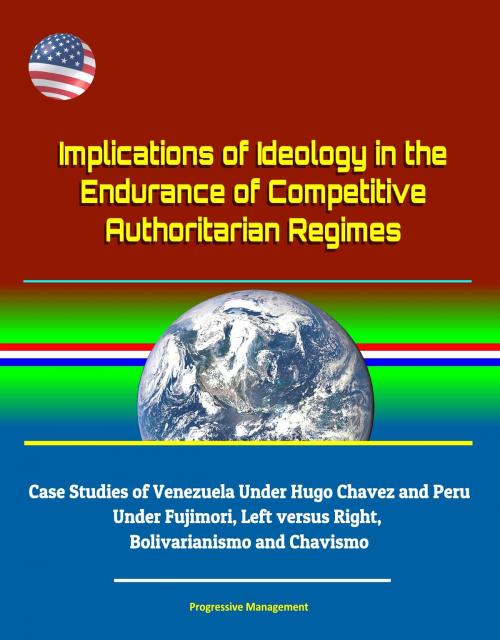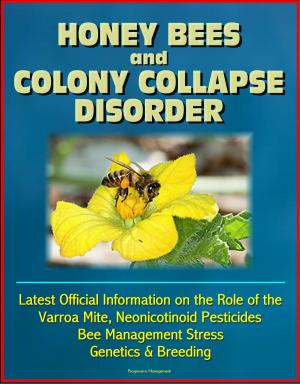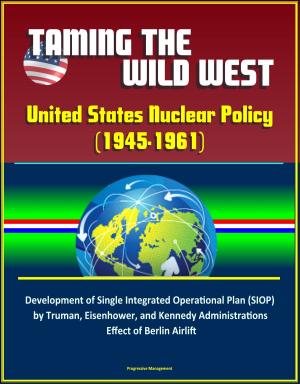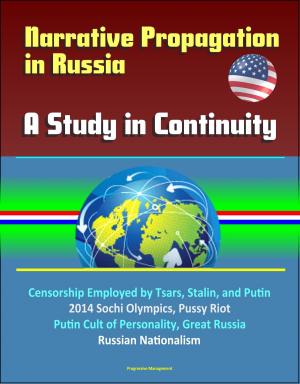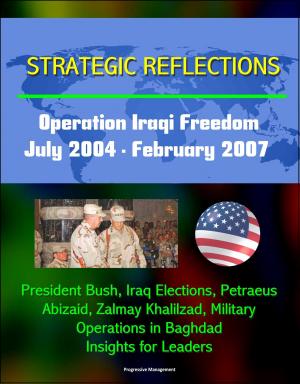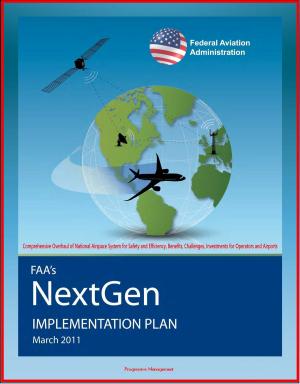Implications of Ideology in the Endurance of Competitive Authoritarian Regimes: Case Studies of Venezuela Under Hugo Chavez and Peru Under Fujimori, Left versus Right, Bolivarianismo and Chavismo
Nonfiction, History, Americas, Latin America, Social & Cultural Studies, Political Science, Government, Communism & Socialism| Author: | Progressive Management | ISBN: | 9780463229088 |
| Publisher: | Progressive Management | Publication: | June 10, 2018 |
| Imprint: | Smashwords Edition | Language: | English |
| Author: | Progressive Management |
| ISBN: | 9780463229088 |
| Publisher: | Progressive Management |
| Publication: | June 10, 2018 |
| Imprint: | Smashwords Edition |
| Language: | English |
This report has been professionally converted for accurate flowing-text e-book format reproduction.
What are the implications of ideology in the endurance of competitive authoritarian regimes? This study aims to study this connection through a comparison of two recent studies in Latin America, Peru, as governed by Alberto Fujimori, and Venezuela, under the rule of Hugo Chavez. Ideology, albeit significant, takes a backseat to economic and security triumphs by the authoritarian. Recently, there has been an increase in strong men rising to power in many countries. If we understand their sources of support, we can better anticipate, prepare, and perhaps even prevent their ascension.
I. INTRODUCTION * A. MAJOR RESEARCH QUESTION * B. SIGNIFICANCE OF THE RESEARCH QUESTION * C. LITERATURE REVIEW * D. POTENTIAL EXPLANATIONS AND HYPOTHESES * E. RESEARCH DESIGN * F. THESIS OVERVIEW AND DRAFT CHAPTER OUTLINE * II. VENEZUELA UNDER HUGO CHAVEZ * A. INTRODUCTION * B. DEMOCRACY IN VENEZUELA * C. WHO WAS HUGO CHAVEZ * D. CHAVEZ POLITICAL AFFILIATIONS * E. LEFT AS AN IDEOLOGY * F. THE LEFT IN LATIN AMERICA * G. THE LEFT IN VENEZUELA * H. THE RIGHT IN VENEZUELA * I. ALTERNATIVE STATEMENTS FOR CHAVEZ'S REGIME ENDURANCE * J. THE CASE FOR IDEOLOGY * K. IDEOLOGY-AUTHORITARIANISM LINK * L. HUGO CHAVEZ THE POPULIST NATIONALIST * 1. Bolivarianismo * 2. Chavismo * M. HUGO CHAVEZ THE EGALITARIAN REFORMIST * N. SUPPORT FOR THE LEFT IN VENEZUELA * O. SUPPORT FOR AUTHORITARIANISM IN VENEZUELA * P. CONCLUSION * III. PERU UNDER FUJIMORI * A. INTRODUCTION * B. DEMOCRACY IN PERU * C. WHO IS ALBERTO FUJIMORI? * D. FUJIMORI'S POLITICAL AFFILIATIONS * 1. Cambio 90 (Change 90) * 2. Nueva Mayoria (New Majority) * 3. Other Parties * E. RIGHT AS AN IDEOLOGY * F. THE RIGHT IN LATIN AMERICA * G. THE RIGHT IN PERU * H. THE LEFT IN PERU * I. ALTERNATIVE STATEMENTS FOR FUJIMORI'S REGIME ENDURANCE * J. THE CASE FOR IDEOLOGY * K. IDEOLOGY-AUTHORITARIANISM LINK * L. FUJIMORI THE NEOPOPULIST * I Autogolpe * 2. Fujimorismo * M. FUJIMORI THE NEOLIBERAL * I. Fujishock * N. SUPPORT FOR THE RIGHT IN PERU * O. SUPPORT FOR AUTHORITARIANISM IN PERU * P. CONCLUSION * IV. CONCLUSION * A. COMPARISON * B. IMPLICATIONS * C. MOVING FORWARD * D. RECOMMENDATIONS * E. SUMMARY
This study seeks to study the link between ideology and the endurance of CARs. I organize my study into four chapters. The first chapter explains CARs as well as provides a brief background into these types of regimes in Peru and Venezuela. Chapters II and III expands on these two CARs through the case studies of Venezuela with Hugo Chavez at the helm and Peru under the rule of Alberto Fujimori. These two chapters will briefly discuss the rise to power of these two rulers and their transition to CA, analyzing the policies adopted by these two leaders in order to test my hypotheses. It concludes with Chapter IV and a comparison of the regimes of Chavez and Fujimori, followed by the implications of the study and some recommendations. The chapter closes with a summary of my findings; LCAs are more enduring than RCAs despite ideology not being as important in the continuation of a regime as economic and security considerations.
This report has been professionally converted for accurate flowing-text e-book format reproduction.
What are the implications of ideology in the endurance of competitive authoritarian regimes? This study aims to study this connection through a comparison of two recent studies in Latin America, Peru, as governed by Alberto Fujimori, and Venezuela, under the rule of Hugo Chavez. Ideology, albeit significant, takes a backseat to economic and security triumphs by the authoritarian. Recently, there has been an increase in strong men rising to power in many countries. If we understand their sources of support, we can better anticipate, prepare, and perhaps even prevent their ascension.
I. INTRODUCTION * A. MAJOR RESEARCH QUESTION * B. SIGNIFICANCE OF THE RESEARCH QUESTION * C. LITERATURE REVIEW * D. POTENTIAL EXPLANATIONS AND HYPOTHESES * E. RESEARCH DESIGN * F. THESIS OVERVIEW AND DRAFT CHAPTER OUTLINE * II. VENEZUELA UNDER HUGO CHAVEZ * A. INTRODUCTION * B. DEMOCRACY IN VENEZUELA * C. WHO WAS HUGO CHAVEZ * D. CHAVEZ POLITICAL AFFILIATIONS * E. LEFT AS AN IDEOLOGY * F. THE LEFT IN LATIN AMERICA * G. THE LEFT IN VENEZUELA * H. THE RIGHT IN VENEZUELA * I. ALTERNATIVE STATEMENTS FOR CHAVEZ'S REGIME ENDURANCE * J. THE CASE FOR IDEOLOGY * K. IDEOLOGY-AUTHORITARIANISM LINK * L. HUGO CHAVEZ THE POPULIST NATIONALIST * 1. Bolivarianismo * 2. Chavismo * M. HUGO CHAVEZ THE EGALITARIAN REFORMIST * N. SUPPORT FOR THE LEFT IN VENEZUELA * O. SUPPORT FOR AUTHORITARIANISM IN VENEZUELA * P. CONCLUSION * III. PERU UNDER FUJIMORI * A. INTRODUCTION * B. DEMOCRACY IN PERU * C. WHO IS ALBERTO FUJIMORI? * D. FUJIMORI'S POLITICAL AFFILIATIONS * 1. Cambio 90 (Change 90) * 2. Nueva Mayoria (New Majority) * 3. Other Parties * E. RIGHT AS AN IDEOLOGY * F. THE RIGHT IN LATIN AMERICA * G. THE RIGHT IN PERU * H. THE LEFT IN PERU * I. ALTERNATIVE STATEMENTS FOR FUJIMORI'S REGIME ENDURANCE * J. THE CASE FOR IDEOLOGY * K. IDEOLOGY-AUTHORITARIANISM LINK * L. FUJIMORI THE NEOPOPULIST * I Autogolpe * 2. Fujimorismo * M. FUJIMORI THE NEOLIBERAL * I. Fujishock * N. SUPPORT FOR THE RIGHT IN PERU * O. SUPPORT FOR AUTHORITARIANISM IN PERU * P. CONCLUSION * IV. CONCLUSION * A. COMPARISON * B. IMPLICATIONS * C. MOVING FORWARD * D. RECOMMENDATIONS * E. SUMMARY
This study seeks to study the link between ideology and the endurance of CARs. I organize my study into four chapters. The first chapter explains CARs as well as provides a brief background into these types of regimes in Peru and Venezuela. Chapters II and III expands on these two CARs through the case studies of Venezuela with Hugo Chavez at the helm and Peru under the rule of Alberto Fujimori. These two chapters will briefly discuss the rise to power of these two rulers and their transition to CA, analyzing the policies adopted by these two leaders in order to test my hypotheses. It concludes with Chapter IV and a comparison of the regimes of Chavez and Fujimori, followed by the implications of the study and some recommendations. The chapter closes with a summary of my findings; LCAs are more enduring than RCAs despite ideology not being as important in the continuation of a regime as economic and security considerations.
